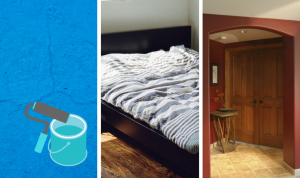
Noise Pollution – How to Combat it at Home
For most people, their home is not just a place they lay their head at night, instead, it’s a refuge from a busy life; a place they connect with friends; and a point of pride. Sometimes though, extra noise can turn that refuge into an annoyance. If you’ve noticed or found yourself fed up with noisiness in your home, there are many ways to address the issue depending on where the problem originates from.
If exterior noise complaints are keeping you up, consider:
- Windows – if you still have single pane windows, consider upgrading to double-pane versions. Noise pollutants can also come through if the window installation was not done correctly. Be sure to check the sealant around the window to be sure it’s closed to bugs, weather and noise.
- Insulation – not all insulation is equal, and if your home is older, there may be improved insulation on the market that can really help soundproof your home. We recommend fiberglass insulation vs. foam spray insulation for soundproofing purposes. Foam works fine for thermal purposes, but is not as effective for noise as a fiberglass.
- Landscaping – the right landscape plan can really improve the sound quality of your home. A fence can do a good job in blocking road noise, then coupled with a tall plant, like arborvitae trees, the flora will help to absorb noise and keep it from bouncing off hard surfaces. An outdoor water feature can create a gentle continuous noise that can obscure more irritating road noise and provide a white-noise feature for your home.
- Window treatments – Window treatments in general can help reduce noise from the outside, but with many new insulated, blackout versions on the market, can really reduce your home’s thermal changes and reduce noises from outside.
- Electrical sockets and switch boxes – this one is an unexpected, but common place where noise can enter the home. If electrical sockets and other switches were not insulated or sealed properly, it’s a direct conduit to the exterior wall of the home, thereby allowing noise and weather to seep in. Look into acoustical caulk, which can help reduce this problem.
- Weatherstripping – we talk about this one a lot because weatherstripping can fail over time. Take a look to make sure light isn’t seeping in from the outside, if it is, weather, bugs and sound will follow.
- Doors – if you have hollow-core doors, sound can pass through pretty easily. Solid-wood doors are your best bet for reducing noise, though they can be a bit spendy.
If it’s interior noise causing concern, look at:
- Soft surfaces – carpeting in rooms, rugs and curtains can all help to reduce noise inside your home. If you have a drummer in the family, nothing is likely to block out the noise completely, but these soft materials can help dampen the transfer of sound.
- Paint – did you know that sound-absorbing paint exists? It does! It’s not a miracle worker, but in combination with some of the other solutions we’ve suggested, you’ll notice a difference in ambient noise.
- Appliances – there are no sound dampening appliances per se, but if your appliances are dated, this may be an easy gimme in terms of reducing the noise inside your home. A new dishwasher that’s energy star rated and has a low decible rating can really help.
- Drywall – soundproof drywall is an option for homeowners really looking for noise reduction. It’ll cost you though – up to 5 times the cost of a regular sheet of drywall, but offers multiple layers of material, for improved sound absorption.
- Flooring – hardwood and tile will increase the noise heard through floors. So if you plan to put hardwood on a second floor, know that sound of people walking, items dropping and the like will carry between floors. Additional fiberglass insulation or underlayments can help counteract this issue. Squeaky floor boards just need to be tightened down to reduce this irritating noise.
- Decorative Elements – bookshelves loaded with books are an easy fix for book-lovers that are sound-sensitive.
- House Design – if you’re really sound sensitive, stay away from open plan homes, as sound will easily carry between spaces. Instead, choose homes where rooms can be closed off, such as a reading room with french doors.
















Leave a Reply